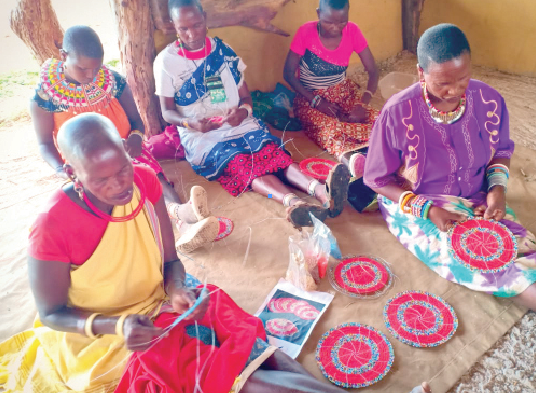Income projects lift Laikipia women from abject poverty

Amidst long standing challenges such as insecurity, food scarcity, famine and Female Genital Mutilation (FGM), there is a ray of hope as women in Laikipia county join hands to face these challenges head on.
In Laikipia North Sub-county, particularly in Mukogodo West, Il Ngwesi and Ngare Ndare wards, women have embraced technology and training to develop their skills.
They have also invested heavily in organic farming, bead work, biogas and making face masks projects to boost their income. On the other hand, they are investing in the future of their children, educating them through sponsorship, as well as fighting gender based violence and protecting the girl child thanks to organisations such as Northern Rangelands Trust (NRT) and Laikipia Conservancies Association (LCA) that have come in handy alongside the local administration.
Unity of purpose
A number of projects by non-profit organisations have been initiated in a bid to ease the suffering of the people, especially with the ravaging effects of drought that has hit the Northern part of the country. Nancy Tausi, Women’s Leader from Ngare Ndare ward says the impact of collective negotiation and unity of purpose has accorded the women something to look forward to.
“We really appreciate efforts by different players to support our struggles because it has been a difficult period. Women suffer the brunt of nomadism, famine, insecurity and food scarcity because they always have children who look up to them. Being a member of the Community Land Management Committee, at least I can speak for the women and share our challenges from a first hand experience. But in the recent time, we have seen some progress in terms of investment, development plans and even proposals from various parties that are willing to help women of Laikipia,” she shares.
She adds, “Today, at least we have biogas projects, which have seen a lot of women take interest in. It boosts their income, but most importantly protects them from the hazards of cutting trees and also being attacked by wild animals while looking for firewood. At the same time, we use our two community lodges, Olingaboli Bandas and Koija Star Beds under Naibunga Lower Conservancy to help our women in the beading business to get markets or clients. On matters of FGM and school drop-outs, we have a dedicated team of elderly women who go around schools and homes to ensure our girls are safe from these risky practices and that they can focus in their education. Indeed, an organisation called ‘Days for Girls’ has offered to make reusable sanitary towels that are eco-friendly, thus helping our girls a great deal,” reveals Tausi.
In Il Ngwesi, scholarship has been of gr
Means of empowerment
eat help to orphaned children and those from single families. Through donor funding, the Il Ngwesi Education project bore the scholarship programme of Sh9.1 million targeting at least 500 students from poor backgrounds. The collaboration of NRT and LCA has helped address the problems in education in the rural areas of Laikipia North.
“Our bursary programmes are very helpful to us now and particularly the girl-child because for a long-time, our girls were not treated equally as their male counterparts. We depend so much on support from NGOs, but also from the tourism monies we collect from our lodges. The era of elders selling their property to educate their children is waning. The most important thing is that even with our challenges, we insist that the bursary programme has to be done in a clear, accountable and balanced way so that nobody feels left out. This programme then translates to a higher uptake of education thus reducing ignorance,” he says.
In neighbouring Mukogodo West under the Naibunga Lower Conservancy in Laikipia North sub-County, education and entreprenuership projects are also taking root to help women feel less strain, especially during harsh economic times. A group known as Chui Mama under the stewardship of Eli Modesta has brought about change in many aspects addressing issues directly affecting women in the area.
“Our organisation caters for widows, single mothers and women who have disabled children. We have at least 1,000 members in our organisation to date. This group was formed primarily to address the challenges women faced in the community and the best way we saw fit was socio-economic empowerment. As a pastoralist community, we were used to seeing women engaging in making local brews and burning charcoal, so we needed to change. We needed something productive and impactful and we are happy to see progress.
Today the group under Chui Mama are marketing their products through wide networks because of the quality input. Among their products are honey, ornaments, soap, sanitary towels, masks and basket. They were not so long ago given 60 beehives and this was a first since before only men owned the hives. This has now helped some of them to get school fees to educate their children. We are currently working on a resource centre that will be a hub for skills development for community members, especially the women,” she says.












